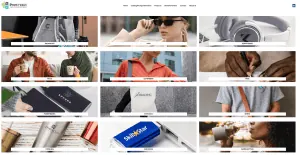T-Shirt Printing Methods: Screen Printing, DTF, Sublimation & More
Table of Contents
5 Main T-shirt Printing Methods
There are 5 main t-shirt printing methods used today: screen printing, direct-to-film (DTF), sublimation, embroidery, and vinyl. Each has unique strengths depending on design complexity, order size, and fabric choice.
If you’re comparing types of printing on t-shirts, the most common options are screen printing for bulk, DTF for small runs, sublimation for polyester, embroidery for logos, and vinyl for personalization. Together, these custom t-shirt printing methods cover everything from affordable giveaways to premium branded apparel.
Want the bigger picture? See how printing fits into styles, fabrics, and costs in our Custom T-Shirts Guide.
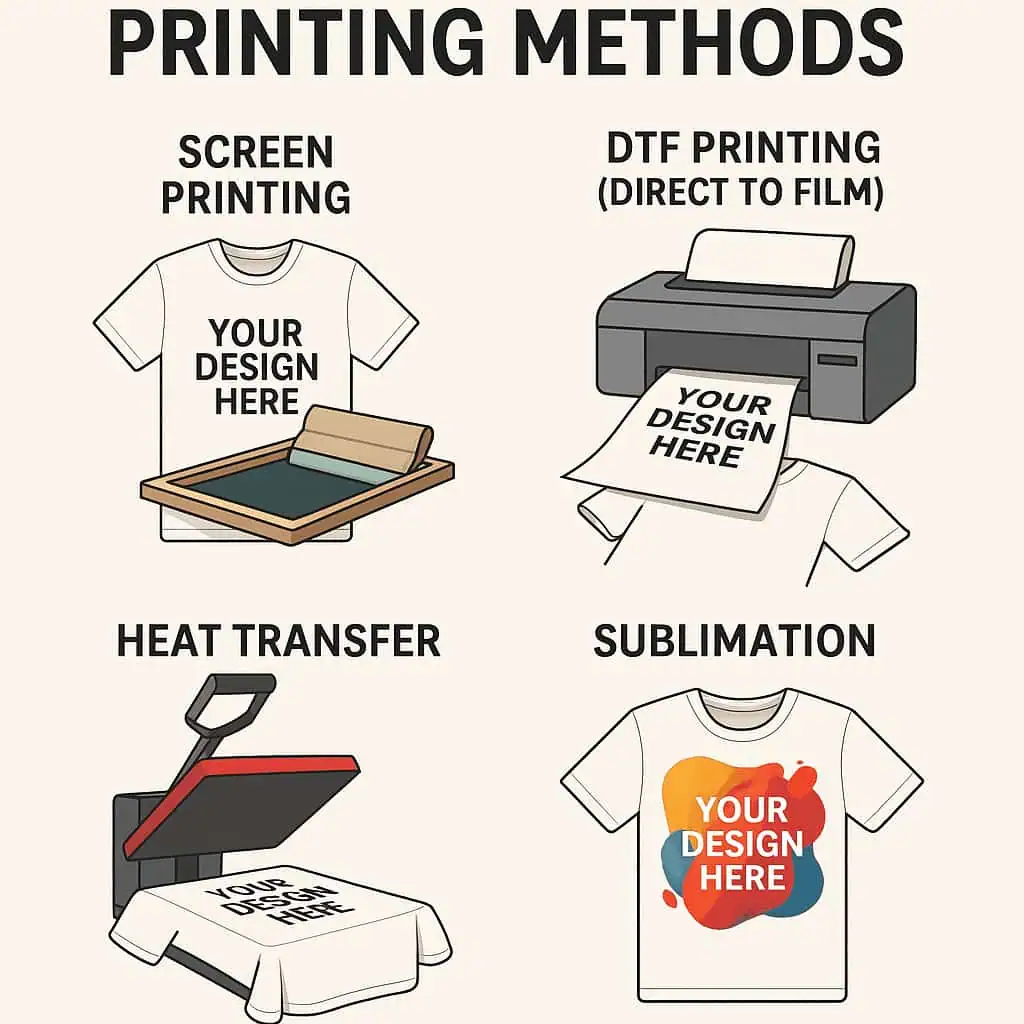
Printing & Customization Methods
Customization transforms an ordinary t-shirt into a powerful tool for fashion, branding, and events. In 2025, several t shirt printing methods dominate the market, each with its own strengths. Your choice of custom printed t-shirts fabric also affects which method works best — cotton, blends, or polyester. Choosing the right one depends on your budget, fabric, design, and order size. These tshirt printing methods give you flexibility depending on fabric, design, and budget.
Screen Printing – Bulk & Bold Designs
Screen printing is the most widely used t-shirt printing method thanks to its durability and vibrant results. It uses stencils and ink pushed through screens to create designs. Cotton is generally the best fabric for screen printing, giving sharp, long-lasting results.
Pros:
Long-lasting, doesn’t fade easily
Works best for bold, simple designs
Cost-effective for large bulk orders
Cons:
Expensive for small runs
Limited in handling highly detailed or multicolor images
Best For:
Bulk promotional t-shirts
Team uniforms and event giveaways
Simple logo or slogan prints
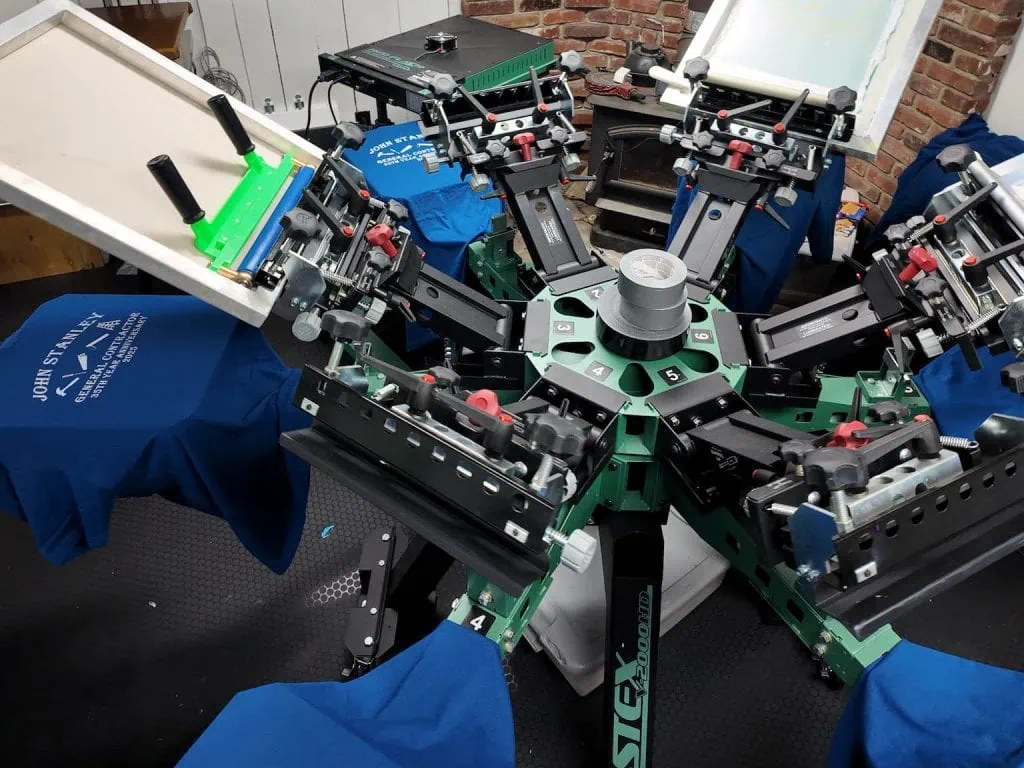
DTF Printing (Direct to Film) – Small Runs & Full Color
Direct-to-Film (DTF) printing has exploded in popularity for its flexibility and ability to handle detailed, full-color designs.
Pros:
Works on cotton, polyester, and blends
Handles complex, colorful designs easily
Affordable for small and medium orders
Cons:
Not quite as durable as screen printing over many washes
Requires special film and adhesive powder
Best For:
Small business branding
Limited-run fashion collections
Personalized t-shirts for events or gifts
Not sure about screen printing vs DTF? We break it down in our DTF vs Screen Printing Guide.
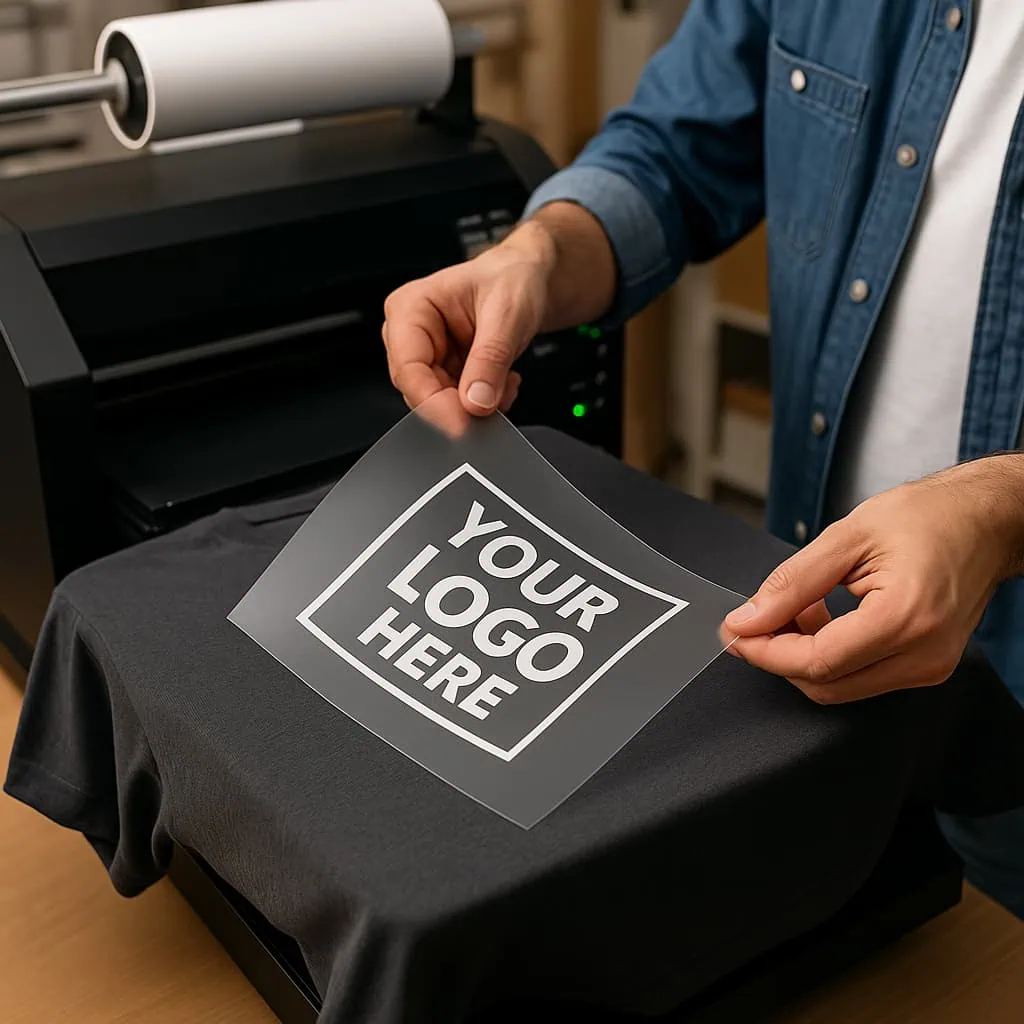
Heat Transfer Vinyl (HTV) – Personalization & One-Offs
Heat transfer printing uses heat and pressure to transfer vinyl or printed designs onto fabric. It’s ideal for fast customization.
Pros:
Great for one-off shirts and small batches
Works for names, numbers, or text personalization
Affordable entry cost
Cons:
Designs may peel or crack over time
Less durable than screen printing or sublimation
Best For:
Sports jerseys with player names/numbers
Personalized gifts and small events
Short-run promotional projects
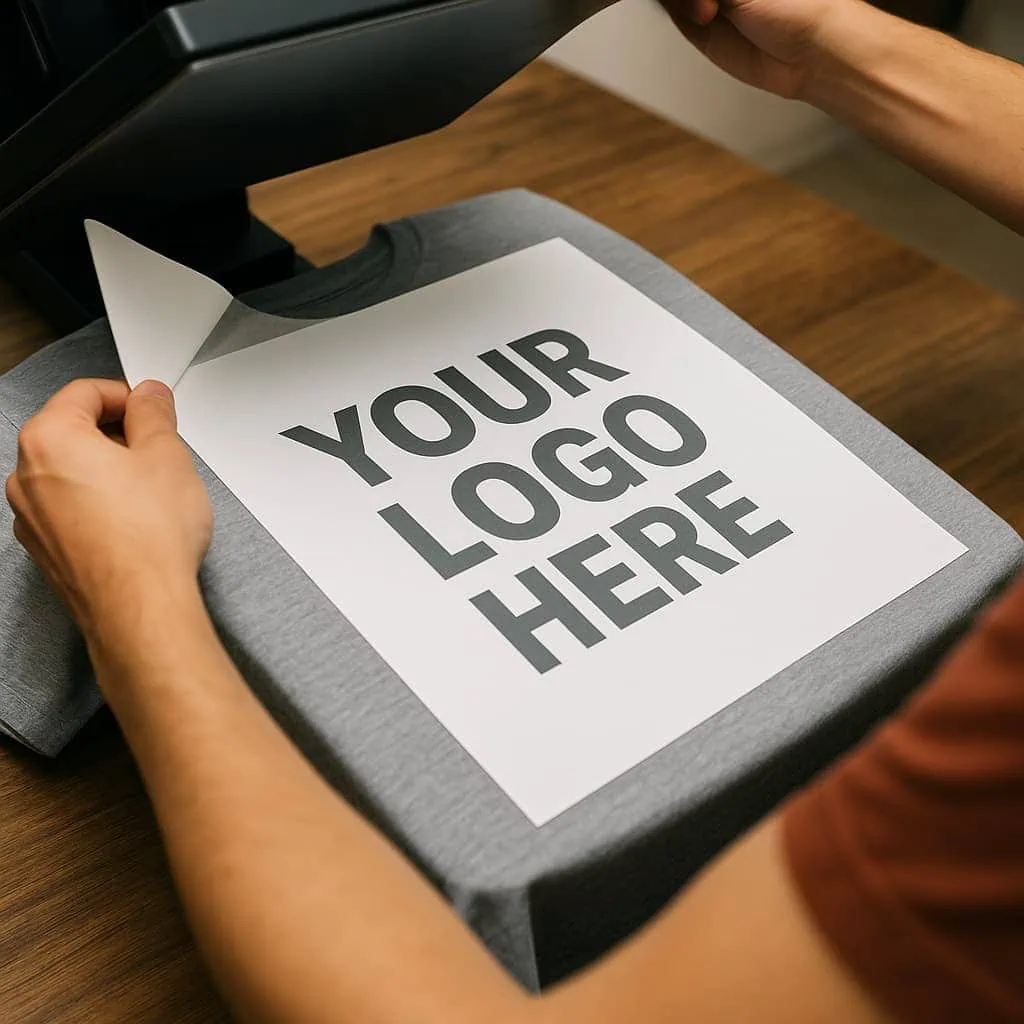
Sublimation – Polyester & All-Over Prints
Sublimation uses heat to fuse dye into polyester fabric, creating bright, permanent designs that don’t fade or crack. Polyester is the required fabric for sublimation printing since the ink bonds with the fibers.
Pros:
Vibrant, full-color prints
Prints become part of the fabric (no peeling)
Ideal for all-over designs
Cons:
Only works on polyester or high-poly blends
Not suitable for cotton shirts
Best For:
Sports jerseys and activewear
Fashion-forward all-over printed t-shirts
Promotional items requiring durability
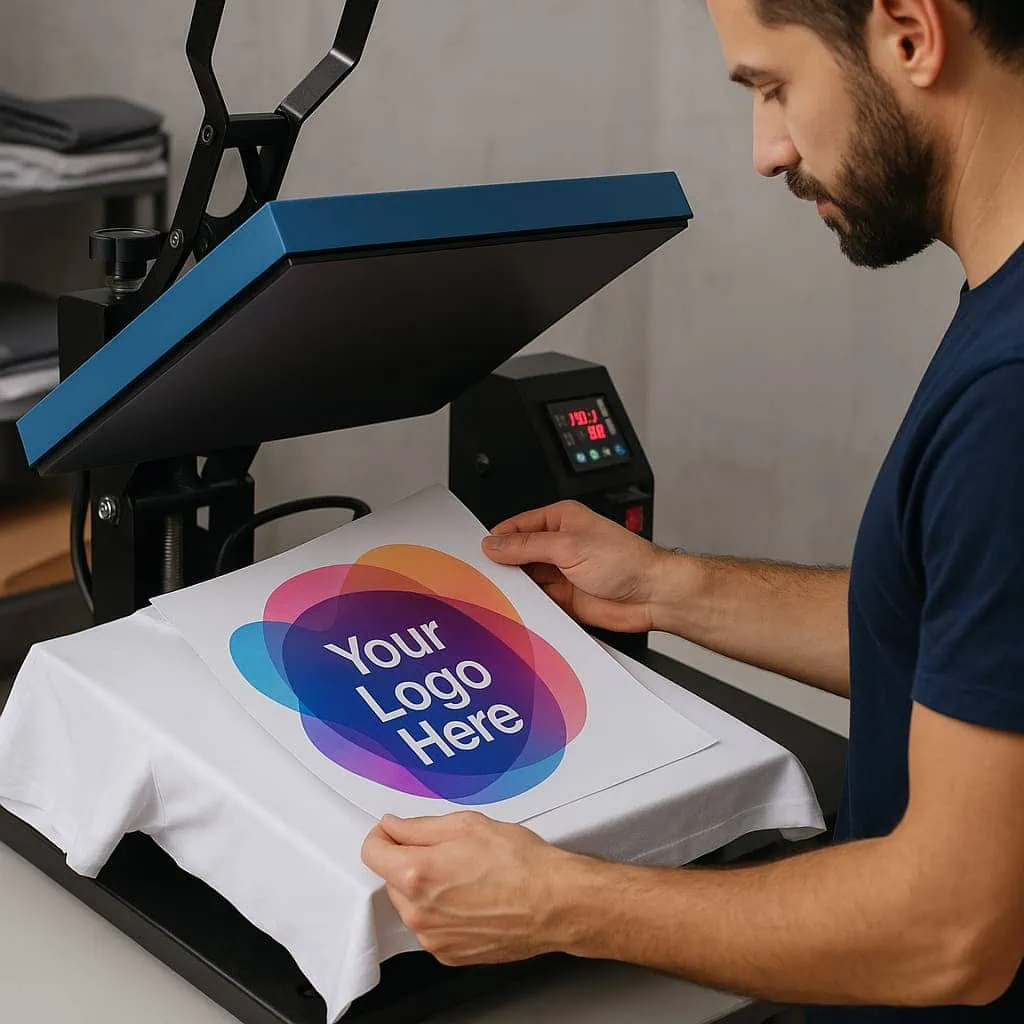
Which Printing Method Should You Choose?
So, what’s the best printing method for t-shirts? It depends on your goals — screen printing is best for bulk, while DTF wins for small runs and full color.
Screen Printing → Best for bulk, simple logos, events.
DTF → Best for small runs, full-color, fast turnaround.
Sublimation → Best for polyester activewear or all-over.
Embroidery → Best for uniforms, premium branding.
Vinyl → Best for personalization like names/numbers.
Not sure which is right for your project? Get a Free Quote and we’ll recommend the best option.
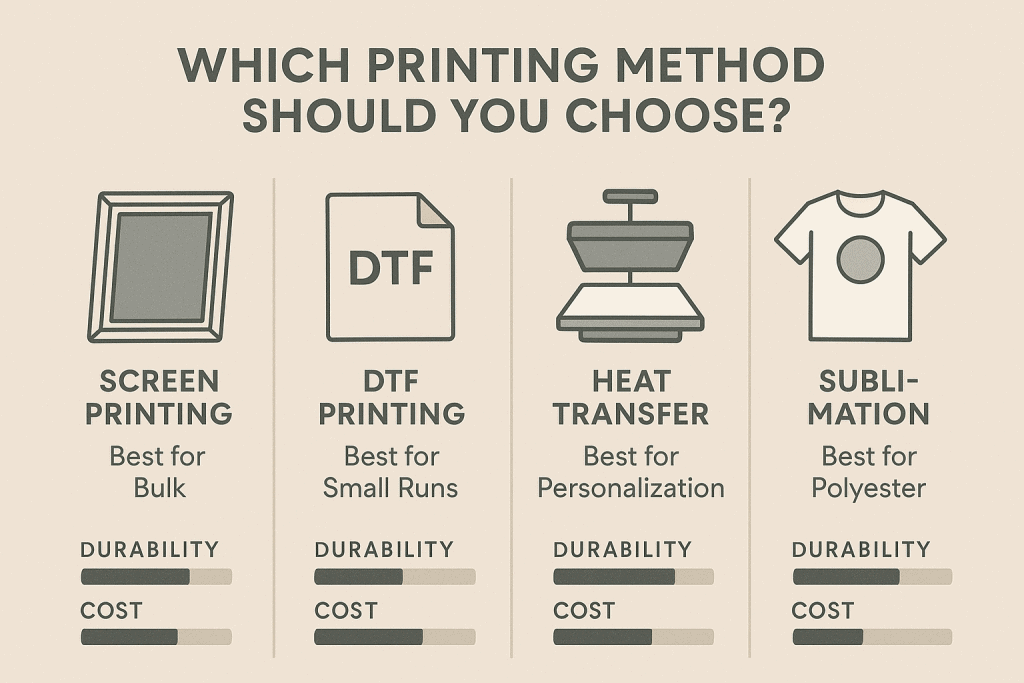
Comparison Table for T-shirt Printing Methods
| Method | Best For | Durability | Cost Efficiency |
|---|---|---|---|
| Screen Printing | Bulk orders, uniforms, simple logos | ★★★★★ Very durable | Best for large quantities |
| DTF Printing | Small/medium runs, detailed designs | ★★★★☆ Durable, but less than screen | Cost-effective for small runs |
| Heat Transfer | Personalized names/numbers, one-offs | ★★★☆☆ Moderate durability | Affordable for small batches |
| Sublimation | Polyester & all-over prints | ★★★★★ Permanent, won’t fade | Higher cost, niche use |
At Print Habit, we use all the major custom t-shirt printing methods in-house, so you always get the right technique for your project.
Frequently Asked Questions About T-Shirt Printing Methods
What are the main types of t-shirt printing methods?
The most popular t-shirt printing methods are screen printing, DTF (direct-to-film), sublimation, heat transfer vinyl (HTV), and embroidery. Each method works best depending on fabric type, order size, and design style.
What is the best printing method for t-shirts?
For bulk orders with simple logos, screen printing is the best printing method for t shirts. For smaller runs or full-color designs, DTF printing is more flexible. For polyester activewear or all-over designs, sublimation t-shirts are the best choice.
Which fabric is best for screen printing?
The best fabric for screen printing is 100% cotton, especially ringspun cotton for softness and durability. Cotton/poly blends also work well, but may affect ink absorption compared to pure cotton.
What fabric is best for sublimation printing?
Sublimation printing only works on polyester t-shirts or high-polyester blends. It cannot be used on 100% cotton because the dye requires polyester fibers to bond permanently.
Is DTF better than screen printing?
DTF vs screen printing depends on your needs: DTF is best for short runs, complex, full-color artwork, or printing on multiple fabric types. Screen printing is better for bulk orders, bold spot colors, and maximum durability.
What fabric works best for custom printed t-shirts?
The right custom printed t-shirts fabric depends on use: cotton for softness, polyester for performance, blends for balance, and poly blends for sublimation designs.
Explore More About Custom T-Shirts
Your local partner for fast, high-quality custom t-shirt printing and logo shirts.
Your complete resource on custom t-shirts — styles, fabrics, printing methods & costs.
Compare the most popular tshirt brands like Gildan, Bella+Canvas, Hanes, Next Level & American Apparel. See how they stack up for bulk orders, fashion, and custom printing.
Crew necks, v-necks, polos, oversized & more — the most popular types of custom t-shirts explained.
Compare t-shirt material types: cotton t-shirts, polyester performance shirts, blends & eco-friendly t-shirts.
Find the best shirts for screen printing and DTF transfers — from affordable Gildan to premium Bella+Canvas blanks.
Compare places to make custom t-shirts: local shops, custom t-shirts online & hybrid providers.
Affordable, durable Gildan 5000 t-shirts – one of the best option for events, schools & businesses.
Custom event t shirts for fundraisers, teams, and promotions. Compare fabrics, printing, and costs for bulk or small runs.
Screen printing, DTF, sublimation & more — compare t-shirt printing methods to find the best option for your design, fabric, and budget.
Compare DTF vs screen printing — costs, durability, print quality & when each method is the best choice for custom t-shirts.
Learn how to wash, dry, and store custom printed t-shirts to keep screen prints, DTF, sublimation, and heat transfers looking fresh and lasting longer.
How to wear t-shirts for casual, business casual, streetwear, festivals, and by season or age group.
Ready to design custom t-shirts? Request a free quote and start your order today.

